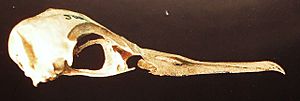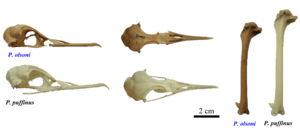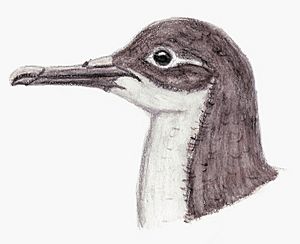Lava shearwater facts for kids
Quick facts for kids Lava shearwaterTemporal range: Holocene
|
|
|---|---|
 |
|
| Skull at the Museum of Nature and Man, Tenerife (Spain). | |
| Conservation status | |
| Scientific classification |
|
| Kingdom: | Animalia |
| Phylum: | Chordata |
| Class: | Aves |
| Order: | Procellariiformes |
| Family: | Procellariidae |
| Genus: | Puffinus |
| Species: |
†P. olsoni
|
| Binomial name | |
| †Puffinus olsoni McMinn, Jaume & Alcover, 1990
|
|
| Script error: The function "autoWithCaption" does not exist. | |
Script error: No such module "Check for conflicting parameters".
The lava shearwater (Puffinus olsoni), also known as Olson's shearwater, was a type of seabird. It belonged to the group of birds called shearwaters. These birds used to live and breed on the islands of Lanzarote and Fuerteventura. These islands are part of the Canary Islands, located off the coast of Africa.
Scientists only learned about the lava shearwater in 1990. They found its fossil remains, which are like ancient bones or traces of living things. These fossils helped them understand what the bird was like. The lava shearwater was a medium-sized bird. It was bigger than a little shearwater but smaller than a Manx shearwater. Many of its bones were found in areas covered by old lava fields.
What Happened to the Lava Shearwater?
Scientists believe the lava shearwater survived for some time after the first people arrived in the Canary Islands. However, it became extinct after European settlers came to the islands in the 15th century. This means the bird completely disappeared from Earth.
Reasons for Extinction
It is thought that the lava shearwater went extinct for a few main reasons. One big reason was likely hunting. Early settlers might have hunted these birds for food. Another problem was the arrival of new animals. These are called introduced species. For example, rats were brought to the islands by ships. Rats could have eaten the shearwater's eggs or young chicks.
See also
 In Spanish: Pardela canaria de la lava para niños
In Spanish: Pardela canaria de la lava para niños
 | Lonnie Johnson |
 | Granville Woods |
 | Lewis Howard Latimer |
 | James West |



